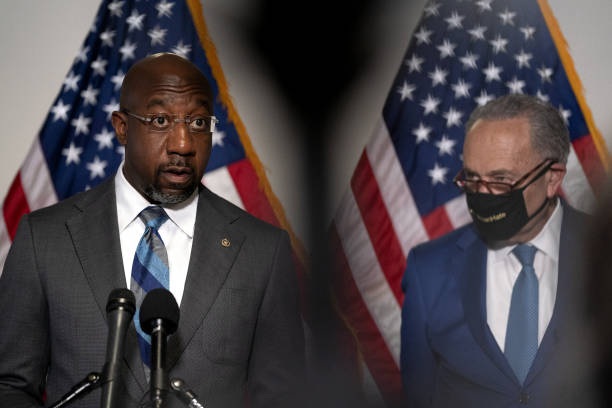
Before getting into who will win the Senate in 2022, it must first be discussed how we got here. In the 2020 election, Democrats were able to take back the U.S. Senate thanks to aggressive campaigning, a historically unpopular Republican president, and two crucial runoff races in the State of Georgia. Newly elected Senators Raphael Warnock and Jon Ossoff gave the Democrats 48 seats, along with two independents that caucus with them, meaning that the Senate is evenly split 50-50. Since President Joe Biden won in November, Vice President Kamala Harris is the tie-breaking vote in the Senate in the event of a 50-50 vote. This means that Democrats effectively have control of the Senate on any party line votes.
What is at Stake?
34 of the 100 seats will be contested, and those are currently held by 14 Democrats and 20 Republicans. As history dictates, the President’s party usually loses seats in the Senate and House of Representatives, so that would presume that Republicans would have the upper hand in taking back the House and Senate in 2022. However, the Senate specifically has more Republicans up for reelection than Democrats (20 to 14). Also, the previous president’s unpopular administration is seemingly still fresh in many swing voters’ minds. This means that a possible retention of control or even an expansion of seats is possible for the Democrats.
Still, many Senators in both parties who currently represent swing states, such as Ron Johnson (R) of Wisconsin and Maggie Hassan (D) of New Hampshire, will be involved in heavily competitive and very expansive races regardless of who is in the White House. 2022, like 2020, will certainly be a year of hard fought campaigning right up until the election on November 8.
The Most Important Races
So with 2022 coming up, let’s take a look at the Senate races which could prove to be competitive. First is perhaps the most sought after seat in the Senate for 2022, in Pennsylvania. Incumbent Republican Senator Pat Toomey’s retirement has caused a frenzy as to who will replace him. Top tier candidates for the Republicans include real estate developer and philanthropist Jeff Bartos and former Trump campaign official and supporter Sean Parnell. For the Democrats, top tier candidates include current Pennsylvania Lieutenant Governor John Fetterman, Pennsylvania State Representative Malcom Kenyatta, and Montgomery County Commission Chairwomen Val Arkoosh. Pennsylvania may very well end up as one of the most expensive Senate races in history.
Another Senate race that is sure to be a nail-biter is North Carolina, where there is also a Republican Senator who is retiring (Richard Burr). Some upper echelon Democrats vying for the seat include North Carolina State Senator and veteran Jeff Jackson and former State Senator Erika Smith, who previously ran for the Senate in 2020. For the Republicans, top line candidates include former North Carolina governor Pat McCrory, former U.S. Representative Mark Walker, and potentially former President Trump’s daughter-in-law Lara Trump. North Carolina, like Pennsylvania, promises to be one of the closest and most expensive Senate races 2022 has to offer.
The 2020 election continues to have parallels to the 2022 election as two likely hotly contested races will involve two candidates that won special elections in their respective states. This includes Arizona Senator Mark Kelly, who narrowly defeated incumbent appointed Senator Martha McSally in 2020. Kelly will face one of many Republicans considering a run for Senate in Arizona, including solar power executive Jim Lamon, U.S. Representative and close Trump ally Andy Briggs, and Major General Michael McGuire. Kelly, a fundraising juggernaut, raised over $4 million in the last quarter of 2020 for his election campaign.
The other race involving a candidate who recently won a special election is Democratic Senator Raphael Warnock of Georgia. He also narrowly won his race, defeating incumbent appointed Senator Kelly Loeffeler by under two percent. Likely Republicans who may challenge Warnock include construction company owner and vocal Trump supporter Kelvin King. Navy veteran and former National Security Council aide Latham Saddler and former U.S. Representative Doug Collins may also run. The Republican field in Georgia may grow far beyond these candidates, as several other individuals such as former University of Georgia football star Herschel Walker have expressed interest. Overall, the Senate races in Arizona and Georgia will go a long way into deciding who will control the Senate.
Control of the Senate Helps
The 2022 election will be one to remember, for both the House of Representatives and the Senate. It really is true that the entire fate of the Senate is up in the air at this moment. Democrats retaining the Senate would go a long way into helping President Biden pass his agenda. But if Republicans seize the Senate, they can start to effectively push back on Biden’s agenda and his cabinet appointees. The Democratic and Republican parties will do everything in their power to ensure they win the Senate in 2022. So for the question of who will win the Senate, the answer is that for now it is a genuine toss up.
Main Photo:
Embed from Getty Images










